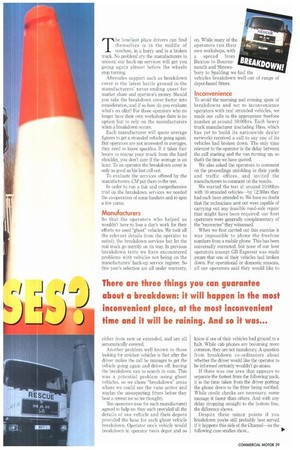T he loneliest place drivers can find themselves is in the
Page 31

If you've noticed an error in this article please click here to report it so we can fix it.
middle of nowhere, in a hurry and in a broken truck. No problem! cry the manufacturers in unison; our back-up services will get you going again almost before the wheels stop turning.
Aftersales support such as breakdown cover is the latest battle ground in the manufacturers' never-ending quest for market share and operator's money. Should you take the breakdown cover factor into consideration, and if so how do you evaluate what's on offer? For those operators who no longer have their own workshops there is no option but to rely on the manufacturers when a breakdown occurs.
Each manufacturer will quote average figures to get a stranded vehicle going again. But operators are not interested in averages, they need to know specifics. If it takes four hours to rescue your truck from the hard shoulder, you don't care if the average is an hour. To an operator the breakdown cover is only as good as his last call-out.
To evaluate the services offered by the manufacturers, CM put them to the test.
In order to run a fair and comprehensive trial on the breakdown services we needed the co-operation of some hauliers and to spin a few yarns.
Manufacturers
So that the operators who helped us wouldn't have to lose a day's work for their efforts we used "ghost" vehicles. We took all the relevant details from the operator to satisfy the breakdown services but let the real truck go merrily on its way. In previous breakdown tests we have encountered problems with vehicles not being on the manufacturers' back-up service register. So this year selection are all under warranty, either from new or extended, and are all automatically covered.
Another problem well known to those looking for stricken vehicles is that after the driver makes the call he manages to get the vehicle going again and drives off, leaving the breakdown van to search in vain. This was a potential problem using ghost vehicles, so we chose "breakdown" areas where we could see the vans arrive and waylay the unsuspecting fitters before they beat a retreat (or so we thought).
Ten operators (one for each manufacturer) agreed to help us: they each provided all the details of one vehicle and their depots provided the base for each ghost vehicle breakdown, Operator one's vehicle would breakdown in operator two's depot and so on. While many of the operators run their own workshops, with a spread from Buxton to Bournemouth and Shrewsbury to Spalding we had the vehicles breakdown well out of range of depot-based fitterS.
Inconvenience
To avoid the morning and evening spate of breakdowns and not to inconvenience operators with real stranded vehicles, we made our calls to the appropriate freefone number at around 10:00hrs. Each heavy truck manufacturer (excluding Hino, which has yet to build its nationwide dealer network) received a call to say one of its vehicles had broken down. The only time relevant to the operator is the delay between the call starting and the van turning up, so that's the time we have quoted.
We also asked the operators to comment on the proceedings unfolding in their yards and traffic offices, and invited the manufacturers to comment on the results.
We started the test at around 10:00hrs with 10 stranded vehicles—by 12:36hrs they had each been attended to. We have no doubt that the technicians sent out were capable of carrying out any feasible road-side repair that might have been required: our host operators were generally complimentary of the "recoveries" they witnessed.
When we first carried out this exercise it was impossible to phone the freefone numbers from a mobile phone. This has been universally corrected, but none of our host operators (except GB Express) was made aware that one of their vehicles had broken down. For operational or domestic reasons, all our operators said they would like to know if one of their vehicles had ground to a halt. While cab phones are becoming more common, they are not mandatory. A question from breakdown co-ordinators about whether the driver would like the operator to be informed certainly wouldn't go amiss.
If there was one area that appears to separate the fastest from the following pack, it is the time taken from the driver putting the phone down to the fitter being notified. While credit checks are necessary, some manage it faster than others. And with any delay dropping straight to the bottom line, the difference shows.
Despite these minor points if you breakdown you're still probably best served if it happens this side of the Channel—as the following case studies show...




























































































